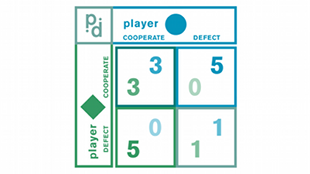 WIKIMEDIA, CHRISTOPHER X JON JENSEN AND GREG RIESTENBERGMathematicians and biologists have long used the prisoner’s dilemma as a model system for understanding cooperation and its evolution in animal groups. But while a recent study identified a selfish strategy that would reap rewards for its practitioners, a paper published last week (August 1) in Nature Communications reveals the downfall of a selfish strategy over time within an evolving population.
WIKIMEDIA, CHRISTOPHER X JON JENSEN AND GREG RIESTENBERGMathematicians and biologists have long used the prisoner’s dilemma as a model system for understanding cooperation and its evolution in animal groups. But while a recent study identified a selfish strategy that would reap rewards for its practitioners, a paper published last week (August 1) in Nature Communications reveals the downfall of a selfish strategy over time within an evolving population.
In the prisoner’s dilemma, two accomplices in crime are apprehended. They are told that if neither of them talks, they will each get a year in prison. If one rats the other out, the rat will get no prison time and the accomplice who stayed loyal will get 3 years in prison. But if both rat each other out, they will each get 2 years in prison.
Mathematicians had determined that, when the game was played over many rounds, the best strategy was for a player to stay loyal initially, then repeatedly do what his or her opponent did in the previous round—a strategy dubbed “tit-for-tat.”
But last year (June 2012), mathematicians Freeman Dyson and William Press published a paper in the Proceedings of the ...






















